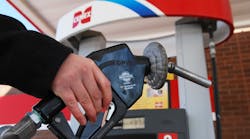While gasoline prices took a dramatic dip in 2015, fleet managers and other drivers who rely on diesel fuel haven’t seen as much relief at the pump. As of September 2018, the national average for a gallon of gasoline is $2.84. Meanwhile, diesel is averaging $3.18. And on-highway diesel fuel prices have been higher than regular grade gasoline prices almost continuously since September 2004. So, why is diesel fuel more expensive than gasoline?
Stronger demand for diesel in other countries
While the U.S. remains reliant on gasoline (approximately 98% of vehicles in America are powered by gasoline), demand for diesel fuel in other countries remains high. A majority of European vehicles use diesel fuel. Growing and developing countries like India and China have placed a greater demand on diesel fuel supplies.
Taxes
Taxes also factor into the higher costs for diesel fuel. The federal tax on diesel fuel is 6 cents more than gasoline per gallon (24.4 cents versus 18.4 cents). The last tax increase came in the early 1990s, when diesel fuel generally cost less than gasoline.
Transition to Ultra Low Sulfur Diesel (ULSD)
ULSD is a clean-burning diesel fuel that was gradually phased into the market between 2006 and 2010, replacing on-highway diesel fuel, known as Low Sulfur Diesel. The environmental benefits of ULSD are huge but they bring extra costs. To produce ULSD, the refining industry had to invest approximately $8 billion into infrastructure. The daily refining costs for ULSD are also higher. All of this influences the cost of diesel fuel.
Seasonality
Fuel oil used for heating homes is made from the same components as diesel fuel. When the demand for heating oil rises in winter, increases in diesel prices tend to follow.
Enhanced additive package
Using premium diesel fuels, like Cenex® Roadmaster XL®, may cost a few cents more per gallon than using typical #2 diesel in the short-term. But over time, premium fuels can save money by reducing downtime, extending equipment life and improving fuel economy. Cenex Roadmaster XL includes a special additive package that helps with the removal and prevention of carbon deposits in the fuel injector for optimum engine performance. Cenex premium diesel fuel has a higher cetane number, better lubricity and injector-cleaning capabilities compared to standard #2 diesel. Cetane measures a fuel’s ignition delay. Higher cetane equals a shorter delay and better ignition for quick starts and less pollution. Lubricity reduces friction, which extends the life of the fuel pump and reduces downtime.
Got questions? Head over to this FAQ page to learn about premium diesel fuels.



